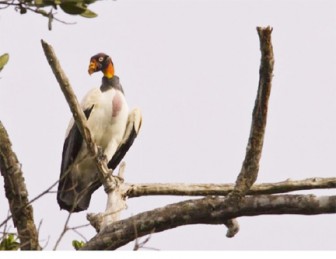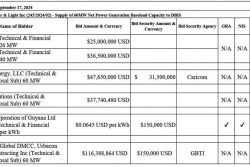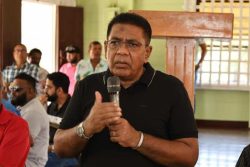The King Vulture, Sarcoramphus papa or Kasana as it known locally by the Makushi people, is the largest bird of the New World Vulture family, Cathartidae, with a length of 67 to 81 cm and a wingspan of 1.2 to 2 m and is distributed throughout

Central and South America. While they are usually found in undisturbed lowland tropical forest, in the Iwokrama Forest and North Rupununi they are more readily spotted in the mountainous areas. This vulture is rarely seen in the savannahs since the decline of the cattle industry.
Vultures are scavengers. Due to their large size, King Vultures tend to feed first from a carcass, keeping smaller vultures at bay until they have eaten enough, thereby offering one possibility of why they are called King Vultures.
King Vultures are easily recognised by their white body, black-edged wings, a short broad black tail and a featherless and multicoloured head varying in colour between yellow, orange, blue, purple or red.
King Vultures mate for life. During the breeding season they are known to have elaborate courtship displays. They nest on the ground and usually lay one egg which both parents care for. King Vultures are not currently endangered, although numbers are declining due to habitat loss.
Rain forests are rich in biodiversity and are home to many different plants and animals. Indigenous communities also find a home there. Even if they don’t live in the rain forest, humans rely on the forest for resources such as building materials (wood and lianas), medicine and fruits. Rain forests also provide essential environmental services for life on earth; they create soil as well as prevent soil erosion, produce oxygen though photosynthesis, maintain clean water systems, and are a key defence against climate change.
The Iwokrama Rain Forest is 371,000 hectares, located in the heart of Guyana. Our mission is to develop strategies for conservation and sustainable development for local people in Guyana and the world at large. We are involved in tourism, training, research and our timber is certified by the Forest Stewardship Council. Come and visit us in the rain forest or at http://www.iwokrama.org.




